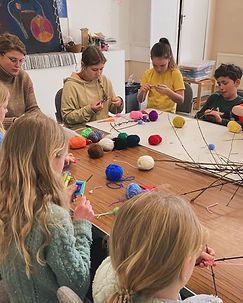
Honey Bees
Ages 9-11 years old
Around the age of 9, children experience a significant shift in their development, often referred to in Waldorf education as the "9-year change" or the "Rubicon." This period marks an important transition in how children perceive themselves and the world around them.
At this stage, children begin to develop a stronger sense of individuality. They start to see themselves as separate from their parents and the wider world, which can sometimes lead to feelings of isolation or insecurity. This newfound awareness often brings a mix of excitement and anxiety.
Children at this age become more critical thinkers. They start questioning things they previously accepted without doubt, including authority figures and established rules. This questioning isn't rebellion, but rather a healthy part of developing their own identity and understanding of the world.
Their relationship with nature also evolves. While younger children often feel a magical, dreamlike connection to the natural world, 9-year-olds begin to observe nature more objectively. They become interested in understanding how things work and why things happen.
Emotionally, 9-year-olds may experience more intense feelings. They might have sudden bursts of anger, sadness, or joy as they navigate their changing perception of the world. It's a time when children need extra support and understanding from adults in their lives.
In Waldorf education, this stage is met with curriculum changes that address the child's new needs. Stories of human struggle and triumph, practical skills, and activities that encourage independence are introduced to support the child through this important transition.
This period, while challenging, lays crucial groundwork for the child's future development. It's a time of awakening that prepares them for the more dramatic changes of adolescence that lie ahead.
Honey Bees Main Lessons
We have some great main lessons planned starting off with Ancient Greece. We will be hearing some of the fabulous, rich myths of the Greek gods, and learning what life was like in Ancient Greek society. We will also learn to write some Ancient Greek letters and discover the origins of the Olympic games.
As autumn draws in and mushrooms start popping up, I will harvest some shaggy ink caps from the downs as part of the Botany main lesson. We will make our own ink from these mushrooms and feel what it is like to write using this ink, with real feather quills! Alongside studying specific mushrooms we will learn some fascinating facts about the kingdom of fungi and other plants in this main lesson.
A main lesson about Local Geography is also timetabled where we will learn how to read maps, create our own maps and make a papier mache model of the British Isles and learn how to read a compass.
Ancient Egypt is another ML planned where we shall hear some great stories from this time and learn to decipher hieroglyphics. We will learn about how mummies were made and marvel at the magnificent construction of the great pyramids at Giza, and hopefully make a model pyramid ourselves.
Each week we will have either a painting or form drawing lesson, and the handwork teachers will bring their creative wonders in the weekly handwork lessons. Honeybees will also have Music and Science with Dr Tom, which have always been a favourite with the children!
Each morning, after singing, movement and recitation we will wake up our brains with 10 mins morning maths before moving on to the topic of the Main Lesson .


